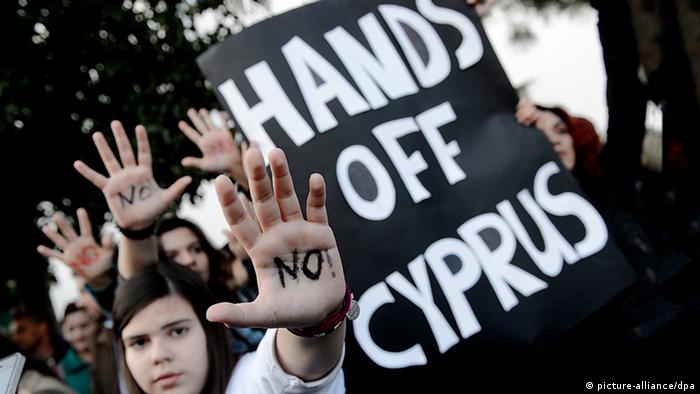Parliament in Cyprus has resoundingly rejected a measure that would tax money in Cypriot bank accounts as a condition of an EU bailout. The country’s banking system needs the bailout to prevent bankruptcy.
The measure received zero votes in favor in the 56-member parliament of Cyprus during Tuesday's vote. Thirty-six parliamentarians voted against the bank tax, and 19 abstained. One parliamentarian was absent.
The levy was intended to raise 5.8 billion euros ($7.5 billion) to help recapitalize the country's banks and service the national debt. This was a key condition of a 10-billion-euro bailout from the eurozone and International Monetary Fund.
News that the measure had failed in parliament was greeted by cheers from protesters gathered outside the parliament building in Nicosia. They had been demonstrating against the bank tax.
The government must now scramble to find another way to come up with the 5.8 billion euros or risk losing the bailout altogether.
Under the terms of the tax, accounts of less than 100,000 euros ($128,000) would have been subject to a levy of 6.75 percent to help finance the bailout. For accounts with more than 100,000 euros, the figure would have jumped to 9.9 percent. An amendment to the bill on Tuesday morning had freed accounts of less than 20,000 euros from the tax completely.
Banks in Cyprus have been closed since Friday and are scheduled to stay closed until Thursday. Withdrawals at cash machines have been capped at 800 euros per day.
This prompted the British government to send a plane of the Royal Air Force stocked with one million euros in cash to Cyprus so British soldiers stationed there would have access to money if they needed it.
A statement released by the British Ministry of Defence said the cash-laden plane was “a contingency measure to provide military personnel and their families with emergency loans in the event that cash machines and debit cards stop working completely.”
The statement added that British troops would also be given the option of having their wages paid into British bank accounts rather than Cypriot ones.
mz/jm (Reuters, dpa, AP, AFP) dw de

Comments